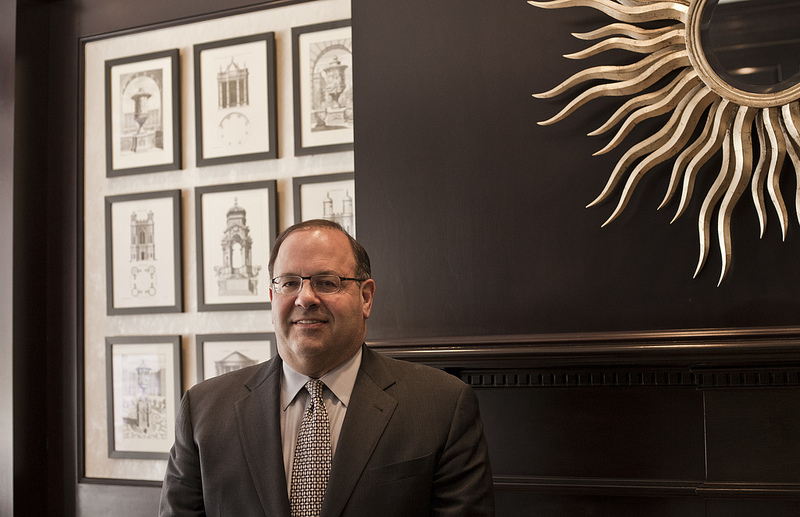Allan Domb: Property Taxes Are Extremely Collectable. So Let’s Get It Done.

Photo of Allan Domb in the lobby of Parc Rittenhouse by Laura Kicey
Property manager/owner/developer Allan Domb, who is also the president of the Greater Philadelphia Association of Realtors (GPAR), has become passionate about property tax collection. Last week he attended the City Council meeting during which Bill Green presented legislation that would encourage the mayor to sell tax liens to private companies. Domb, who ideally would like the property tax rate to be 1 percent rather than 1.34, testified at the meeting in support of the bill, which passed 15-2.
Domb told us that when he looked into areas where the city might save money, he kept running into the issue of real estate delinquencies (all municipal delinquencies total $1.6 billion). “Fifteen percent of the population doesn’t pay property taxes,” he said. Even more galling, “40 percent of those delinquent owners are investors who don’t even live in Philadelphia.”
“The goal was, how do we collect the money? We started speaking to several people — Ira Luber, Gerry Sweeney, Philadelphia Controller Alan Butkovitz, who’s been very helpful — and we discovered that 27 other states do tax lien sales. New Jersey does it — Camden, Trenton and Newark collect 98 percent of their property taxes. These taxes are extremely collectable.”
If Philadelphia implements that same tax lien sale certificate program, Domb calculates the city could collect $$250 to $300 million of the $465 million delinquent real estate taxes. “We think the city could collect, and at a time when the city needs money for the schools, infrastructure, fire, police. It’s not a Republican or Democratic issue. It’s just good for the city.”
Domb acknowledges that not everyone is in favor of the strategy — like the two Council members who voted against the bill. But he thinks it’s a misunderstanding of sorts. “Those two opposed are worried about Mrs. Smith getting foreclosed and being out on the street. So we’ll set up a fund to help her, lend her the money. That’s not our delinquency.” Domb feels residents who are behind in their taxes aren’t the issue — it’s the out-of-town investors he’s concerned with. “We’re not looking to put anybody on the street.”
Though Mayor Nutter does technically have the ability to sell tax liens, the way it’s structured now doesn’t work, says Domb. “We don’t have [the right] tool on the books. The Senate and the House need to amend it. The more teeth in the bill, the more valuable it becomes to the city.”
Aside from his role as GPAR president, is it possible that Domb — who is known for always having a new project up his proverbial sleeve — has a personal stake in this legislation? “I have no interest in buying tax liens,” he says. “I want the city to get the money.” The mismanagement offends him, particularly because he feels the money belongs to the taxpayers. And the inefficiency is bound to nettle someone known for getting things done. “Nobody in a business would allow this to occur.”


